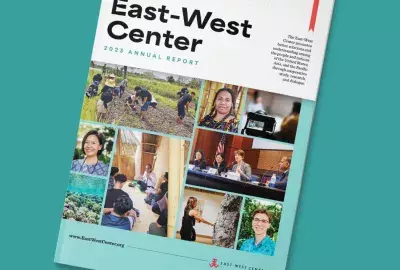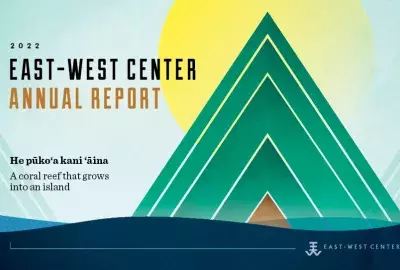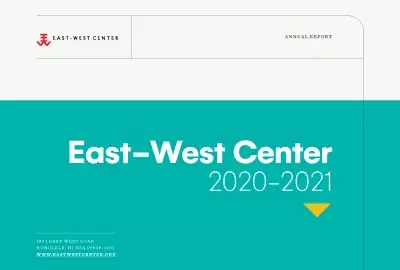Error message
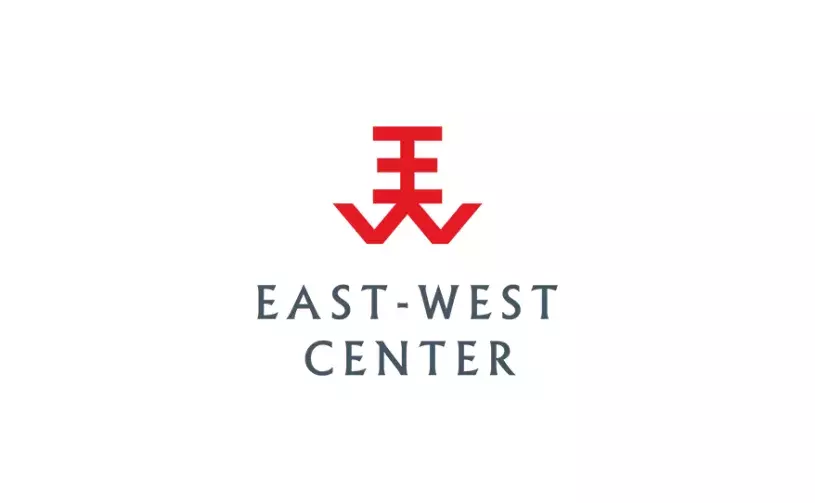
Message from the East-West Center President
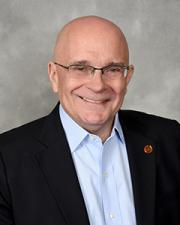
Next year the East-West Center will celebrate its 60th anniversary, an important milestone in the Center’s services to people and institutions in the U.S. and across Asia and the Pacific.
This Annual Report actually summarizes the past two years of Center activities. During that time, we have conducted a SWOT analysis of our facilities to determine upgrading priorities, and all departments have gone through program reviews to refine and strengthen our rich menu of activities.
I am pleased to report that the Center continues to thrive.
Student numbers are now increasing, as are the formal and informal activities to enhance students’ international and cross-cultural experience. We have recast and expanded our professional capacity-building and leadership programs both in Hawai‘i and now in the region, often drawing upon our alumni for assistance and expertise.
We have been reinvigorating our Pacific Islands programs in preparation for the roll-out of an ambitious initiative that will soon involve all departments.
Just one of many highly relevant research programs is in climate-change adaptation in the Pacific, including sea-level rise, variations in storm intensity and frequency, and impact on migration.
And the Center’s reputation as a local and international gathering place has grown with intensified use of Jefferson Hall and a significant increase in our VIP briefings and roundtables.
These are but a few highlights. Please visit our beautiful campus to witness firsthand our activities and learn more about our successes as well as our challenges, plans, and hopes for the future.
Dr. Richard R. Vuylsteke
Developing Tomorrow’s Leaders
NEW Pacific Islands program
In 2018 the Center added the Pacific Tourism Professional Fellows Program to its suite of innovative professional-development programs. Special training programs continued for Southeast Asian resource managers, emerging Pacific Islands leaders, women community leaders in Micronesia, and female social and economic entrepreneurs.
Two reunions for Pacific Islands alumni
Participants from five years of the Pacific Islands Leadership Program with Taiwan gathered in Honiara, Solomon Islands. Recipients of the U.S.-South Pacific Scholarship reunited in Fiji to celebrate 25 years of the U.S. Department of State-funded undergraduate scholarship.
Featured Student
Mongolia’s Tsolmontuya “Tsom” Altankhundaga, an Asian Development Bank scholarship student in Public Administration, is one of more than 350 graduate students and professionals in the Center’s international residential community. In spring 2018, she worked for the Center’s professional women’s networking event and went on to intern for Mongolia’s National Committee on Gender Equality, where she helped organize an international conference on gender and development. She is now a cofounder of a new international women’s group at the Center.
Convening Thought Leaders
Women20 for the G20 dialogue
The Center hosted representatives of NGOs and female entrepreneur associations, scientists, and heads of state for an official G20 dialogue in June 2017. Sponsored by global financial services firm EY, the consultation generated recommendations for national policies to advance women’s economic equality.
The future of Smart Cities
The Center’s inaugural “smart cities” dialogue convened officials and industry experts from global cities in 2018. Participants included Alphabet, Inc; the City of Bandung, Indonesia; GE; IBM; the Lee Kwan Yew School of Public Policy; Mastercard; Microsoft; the National University of Singapore; and the National League of Cities.
East-West Center/EWC Association International Alumni Conference
Our 2018 alumni gathering in Seoul brought together around 350 educators, officials, scholars, and business leaders from dozens of countries. Conference programs focused on social justice, sustainable growth, far-reaching technological transformations, and conflict reduction. A diplomatic roundtable featured the newly appointed U.S. Ambassador to South Korea, Harry Harris, and the Ambassadors of Australia, Japan, and Singapore.
Insights and Strategies
Asia Matters for America/America Matters for Asia
The EWC’s Washington office launched an updated Asia Matters publication and website in Singapore during the East Asia Summit. For ten years, Asia Matters has offered interactive data and analysis products covering a wide variety of topics in relations between the U.S. and Indo-Pacific countries. Additional launches in 2017-18 focused specifically on U.S. relations with ASEAN, India, and South Korea.
Policy-relevant research
The Center’s Research Program continued to produce collaborative work on critical issues. Ongoing projects are analyzing how population change affects Asian economies, modeling the HIV/AIDS epidemics in Asia, documenting agricultural transformation in Asia and forest recovery in rural Nepal, planning climate change adaptation for Pacific Islands, and exploring the rise of China and political tensions throughout Asia and the Pacific.
Building Expertise, Driving Solutions: Highlights from 2018
The East-West Center’s 6th International Media Conference (June 2018)
More than 400 journalists from 42 countries met in Singapore to cap a year-long celebration of 50 years of EWC media-exchange programs. Some 3,000 media professionals from every country in the Indo-Pacific region and many beyond have deepened their understanding of contemporary issues and cultures through Center media programs.
NPR Public Editor Elizabeth Jensen launched the commemoration with an address on “Restoring Public Trust in the Media.” Other speakers included Maria Ressa, later named a TIME magazine “Person of the Year”, who spoke on “Undermining the Free Press in Asia”.
Fourth National Climate Assessment Vol II (November 2018)
The East-West Center contributed to the most significant U.S. report to assess the effects of climate change on the U.S. economy and communities. According to EWC Research Fellow Dr. Victoria Keener, lead author of the Hawai‘i-Pacific chapter and principal investigator for the Pacific Islands Regional Integrated Sciences and Assessments (Pacific RISA), the report made “clear that climate change has arrived far sooner and as a greater threat than we previously thought”.
Pacific RISA works with communities in Hawai‘i and the U.S.–Affiliated Pacific Islands to support practical adaptation to the impacts of climate variability and change.
Financial Summary
For the fiscal year ended 30 September 2018:
Revenues: $28.9 million
- Federal appropriation: 58%
- Donations and other sources: 24%
- Federal contracts and grants: 10%
- Other contracts and grants: 8%
Expenses: $27.2 million
- Education, research, and training programs: 71%
- Program direction, administration, and program support: 29%
For the fiscal year ended 30 September 2017:
Revenues: $33.2 million
- Federal appropriation: 50%
- Donations and other sources: 29%
- Other contracts and grants: 13%
- Federal contracts and grants: 8%
Expenses: $28.7 million
- Education, research, and training programs: 70%
- Program direction, administration, and program support: 30%
About the East-West Center
The East-West Center promotes better relations and understanding among the people and nations of the Asia-Pacific region. Each year the Center engages more than 3,000 people to build knowledge and capabilities to tackle critical regional challenges. The Center develops cutting-edge expertise by leveraging individual and institutional contacts around the world. These networks identify trends, serve as resources for programs, and help create new initiatives to address needs in the region.
The East-West Center is a nonpartisan, nonprofit, international educational institution. Founded in 1960 and partially funded by the U.S. Congress, the Center is supported by individuals, foundations, corporations, and U.S. and foreign government departments and agencies.
The Center’s 21-acre Honolulu campus is adjacent to the University of Hawai‘i, and includes research, residential, guest, and conference facilities. The Center’s Washington D.C. office enhances U.S. engagement and dialogue with the Indo-Pacific region through access to the programs and expertise of the Center and policy-relevant research, publications, and outreach activities.
East-West Center Board of Governors
The East-West Center Board of Governors consists of 18 members. The Governor of Hawai‘i appoints five members, the U.S. Secretary of State appoints five members, and these ten members in turn elect five members from Asia and the Pacific Islands. There are also three ex-officio members: the Governor of Hawai‘i, the U.S. Assistant Secretary of State for Educational and Cultural Affairs, and the President of the University of Hawai‘i.
East-West Center Foundation
The East-West Center Foundation is a private, nonprofit organization established to broaden and diversify private support for the Center. Private contributions, grants, and sponsorship, supplemented by competed funding from governments of the Indo-Pacific region and the U.S., are used to support EWC programs and student scholarships.
Message from the East-West Center President

Next year the East-West Center will celebrate its 60th anniversary, an important milestone in the Center’s services to people and institutions in the U.S. and across Asia and the Pacific.
This Annual Report actually summarizes the past two years of Center activities. During that time, we have conducted a SWOT analysis of our facilities to determine upgrading priorities, and all departments have gone through program reviews to refine and strengthen our rich menu of activities.
I am pleased to report that the Center continues to thrive.
Student numbers are now increasing, as are the formal and informal activities to enhance students’ international and cross-cultural experience. We have recast and expanded our professional capacity-building and leadership programs both in Hawai‘i and now in the region, often drawing upon our alumni for assistance and expertise.
We have been reinvigorating our Pacific Islands programs in preparation for the roll-out of an ambitious initiative that will soon involve all departments.
Just one of many highly relevant research programs is in climate-change adaptation in the Pacific, including sea-level rise, variations in storm intensity and frequency, and impact on migration.
And the Center’s reputation as a local and international gathering place has grown with intensified use of Jefferson Hall and a significant increase in our VIP briefings and roundtables.
These are but a few highlights. Please visit our beautiful campus to witness firsthand our activities and learn more about our successes as well as our challenges, plans, and hopes for the future.
Dr. Richard R. Vuylsteke
Developing Tomorrow’s Leaders
NEW Pacific Islands program
In 2018 the Center added the Pacific Tourism Professional Fellows Program to its suite of innovative professional-development programs. Special training programs continued for Southeast Asian resource managers, emerging Pacific Islands leaders, women community leaders in Micronesia, and female social and economic entrepreneurs.
Two reunions for Pacific Islands alumni
Participants from five years of the Pacific Islands Leadership Program with Taiwan gathered in Honiara, Solomon Islands. Recipients of the U.S.-South Pacific Scholarship reunited in Fiji to celebrate 25 years of the U.S. Department of State-funded undergraduate scholarship.
Featured Student
Mongolia’s Tsolmontuya “Tsom” Altankhundaga, an Asian Development Bank scholarship student in Public Administration, is one of more than 350 graduate students and professionals in the Center’s international residential community. In spring 2018, she worked for the Center’s professional women’s networking event and went on to intern for Mongolia’s National Committee on Gender Equality, where she helped organize an international conference on gender and development. She is now a cofounder of a new international women’s group at the Center.
Convening Thought Leaders
Women20 for the G20 dialogue
The Center hosted representatives of NGOs and female entrepreneur associations, scientists, and heads of state for an official G20 dialogue in June 2017. Sponsored by global financial services firm EY, the consultation generated recommendations for national policies to advance women’s economic equality.
The future of Smart Cities
The Center’s inaugural “smart cities” dialogue convened officials and industry experts from global cities in 2018. Participants included Alphabet, Inc; the City of Bandung, Indonesia; GE; IBM; the Lee Kwan Yew School of Public Policy; Mastercard; Microsoft; the National University of Singapore; and the National League of Cities.
East-West Center/EWC Association International Alumni Conference
Our 2018 alumni gathering in Seoul brought together around 350 educators, officials, scholars, and business leaders from dozens of countries. Conference programs focused on social justice, sustainable growth, far-reaching technological transformations, and conflict reduction. A diplomatic roundtable featured the newly appointed U.S. Ambassador to South Korea, Harry Harris, and the Ambassadors of Australia, Japan, and Singapore.
Insights and Strategies
Asia Matters for America/America Matters for Asia
The EWC’s Washington office launched an updated Asia Matters publication and website in Singapore during the East Asia Summit. For ten years, Asia Matters has offered interactive data and analysis products covering a wide variety of topics in relations between the U.S. and Indo-Pacific countries. Additional launches in 2017-18 focused specifically on U.S. relations with ASEAN, India, and South Korea.
Policy-relevant research
The Center’s Research Program continued to produce collaborative work on critical issues. Ongoing projects are analyzing how population change affects Asian economies, modeling the HIV/AIDS epidemics in Asia, documenting agricultural transformation in Asia and forest recovery in rural Nepal, planning climate change adaptation for Pacific Islands, and exploring the rise of China and political tensions throughout Asia and the Pacific.
Building Expertise, Driving Solutions: Highlights from 2018
The East-West Center’s 6th International Media Conference (June 2018)
More than 400 journalists from 42 countries met in Singapore to cap a year-long celebration of 50 years of EWC media-exchange programs. Some 3,000 media professionals from every country in the Indo-Pacific region and many beyond have deepened their understanding of contemporary issues and cultures through Center media programs.
NPR Public Editor Elizabeth Jensen launched the commemoration with an address on “Restoring Public Trust in the Media.” Other speakers included Maria Ressa, later named a TIME magazine “Person of the Year”, who spoke on “Undermining the Free Press in Asia”.
Fourth National Climate Assessment Vol II (November 2018)
The East-West Center contributed to the most significant U.S. report to assess the effects of climate change on the U.S. economy and communities. According to EWC Research Fellow Dr. Victoria Keener, lead author of the Hawai‘i-Pacific chapter and principal investigator for the Pacific Islands Regional Integrated Sciences and Assessments (Pacific RISA), the report made “clear that climate change has arrived far sooner and as a greater threat than we previously thought”.
Pacific RISA works with communities in Hawai‘i and the U.S.–Affiliated Pacific Islands to support practical adaptation to the impacts of climate variability and change.
Financial Summary
For the fiscal year ended 30 September 2018:
Revenues: $28.9 million
- Federal appropriation: 58%
- Donations and other sources: 24%
- Federal contracts and grants: 10%
- Other contracts and grants: 8%
Expenses: $27.2 million
- Education, research, and training programs: 71%
- Program direction, administration, and program support: 29%
For the fiscal year ended 30 September 2017:
Revenues: $33.2 million
- Federal appropriation: 50%
- Donations and other sources: 29%
- Other contracts and grants: 13%
- Federal contracts and grants: 8%
Expenses: $28.7 million
- Education, research, and training programs: 70%
- Program direction, administration, and program support: 30%
About the East-West Center
The East-West Center promotes better relations and understanding among the people and nations of the Asia-Pacific region. Each year the Center engages more than 3,000 people to build knowledge and capabilities to tackle critical regional challenges. The Center develops cutting-edge expertise by leveraging individual and institutional contacts around the world. These networks identify trends, serve as resources for programs, and help create new initiatives to address needs in the region.
The East-West Center is a nonpartisan, nonprofit, international educational institution. Founded in 1960 and partially funded by the U.S. Congress, the Center is supported by individuals, foundations, corporations, and U.S. and foreign government departments and agencies.
The Center’s 21-acre Honolulu campus is adjacent to the University of Hawai‘i, and includes research, residential, guest, and conference facilities. The Center’s Washington D.C. office enhances U.S. engagement and dialogue with the Indo-Pacific region through access to the programs and expertise of the Center and policy-relevant research, publications, and outreach activities.
East-West Center Board of Governors
The East-West Center Board of Governors consists of 18 members. The Governor of Hawai‘i appoints five members, the U.S. Secretary of State appoints five members, and these ten members in turn elect five members from Asia and the Pacific Islands. There are also three ex-officio members: the Governor of Hawai‘i, the U.S. Assistant Secretary of State for Educational and Cultural Affairs, and the President of the University of Hawai‘i.
East-West Center Foundation
The East-West Center Foundation is a private, nonprofit organization established to broaden and diversify private support for the Center. Private contributions, grants, and sponsorship, supplemented by competed funding from governments of the Indo-Pacific region and the U.S., are used to support EWC programs and student scholarships.





